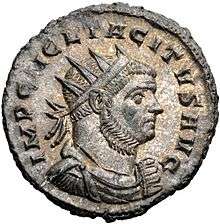Florianus
| Florianus | |||||||||
|---|---|---|---|---|---|---|---|---|---|
|
An illustration of Florianus, based on coins minted bearing his image. | |||||||||
| Emperor of the Roman Empire | |||||||||
| Reign | July – September 276 | ||||||||
| Predecessor | Tacitus | ||||||||
| Successor | Probus | ||||||||
| Died |
September 276 Tarsus, Cilicia | ||||||||
| |||||||||
Florianus (Latin: Marcus Annius Florianus Augustus; died 276), also known as Florian, was Roman Emperor in 276, from July to September. He was the maternal half-brother of Tacitus, who was proclaimed emperor in late 275, after the unexpected death of Emperor Aurelian. After Tacitus died in July 276, allegedly assassinated as a consequence of a military plot, Florianus proclaimed himself emperor, with the recognition of the Roman Senate and much of the empire. However, Florianus soon had to deal with the revolt of Probus, who rose up shortly after Florianus ascended the throne, with the backing of the provinces of Egypt, Syria, Palestine, and Phoenicia. Probus took advantage of the terrain of the Cilician Gates, and the hot climate of the area, which Florianus' army was unaccustomed to, to chip away at their morale. Because of this, in September 276, Florianus' army rose up against him and killed him.
History

In late 275, Florianus' maternal half-brother, Tacitus, was proclaimed Roman Emperor after the unexpected death of Emperor Aurelian. Soon after, Tacitus appointed Florianus as praetorian prefect.[1][2] Tacitus then ordered Florianus to lead troops to Pannonia, in order to repel raids into Roman territory by the Goths.[3] After Tacitus died suddenly in July 276, allegedly as a consequence of a military plot, Florianus swiftly proclaimed himself emperor, and was recognized as such by the Roman Senate, and the western provinces.[4] Florianus then continued to campaign against the Goths, winning a major victory before the news reached him of the revolt of Probus,[5] the half-brother of Tacitus, who had served successfully as a commander under both Aurelian and Tacitus. Probus' revolt was supported by the provinces of Egypt, Syria, Palestine, and Phoenicia.[4]
Despite his military experience, Probus was in a precarious position, as he held the support of only a small part of the Empire, while much of the Empire backed Florianus.[5] Probus also took advantage of his control of Egyptian grain, which he used to swiftly cut off the supply of grain to the rest of the empire. Probus led his troops to Asia Minor, in order to defend the Cilician Gates, allowing him to utilize guerrilla warfare to wage a war of attrition rather than a straightforward confrontation. Florianus led his troops to Cilicia, and billeted his forces in Tarsus. However many of his troops, who were unaccustomed to the hot climate of the area, fell ill due to a summer heat wave. Upon learning of this, Probus launched raids around the city, in order to weaken the morale of Florianus' forces. This strategy was successful, and Florianus lost control of his army, which in September rose up against him and killed him.[4][6] In total, Florianus' reign lasted less than three months.[4]
References
Citations
- ↑ Meijer 2004, p. 102.
- ↑ Hebblewhite 2016, p. 11.
- ↑ Bédoyère 2017, p. 259.
- 1 2 3 4 Meijer 2004, p. 103.
- 1 2 Syvanne 2015, p. 171.
- ↑ Syvanne 2015, p. 172.
Bibliography
- Bédoyère, Guy de la (2017). Praetorian: The Rise and Fall of Rome's Imperial Bodyguard. Yale University Press. ISBN 9780300226270.
- Hebblewhite, Mark (2016). The Emperor and the Army in the Later Roman Empire, AD 235–395. Taylor & Francis. ISBN 9781317034308.
- Meijer, Fik (2004). Emperors Don't Die in Bed. Routledge. ISBN 9780415312011.
- Syvanne, Ilkka (2015). Military History of Late Rome 284-361. Pen and Sword. ISBN 9781848848559.
External links
![]()
| Regnal titles | ||
|---|---|---|
| Preceded by Tacitus |
Roman Emperor 276 |
Succeeded by Probus |